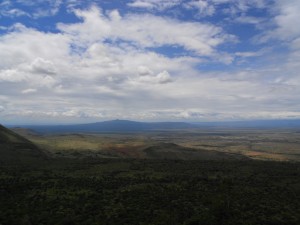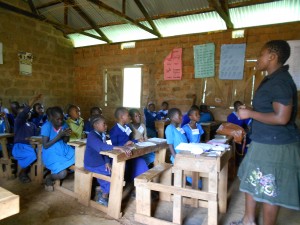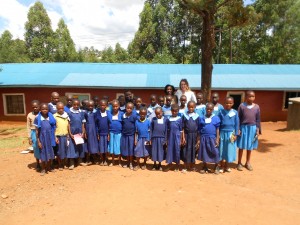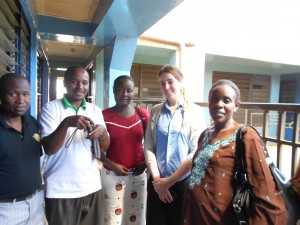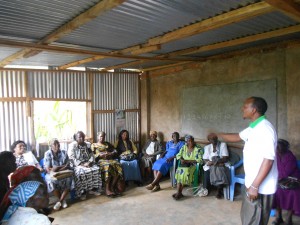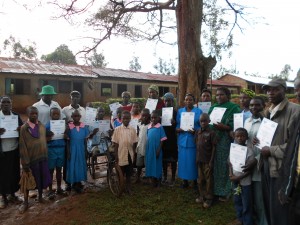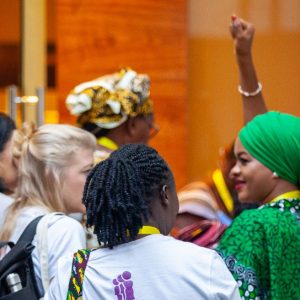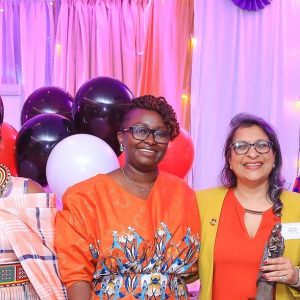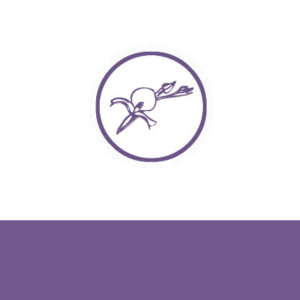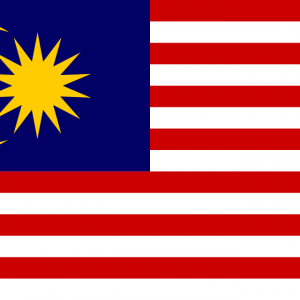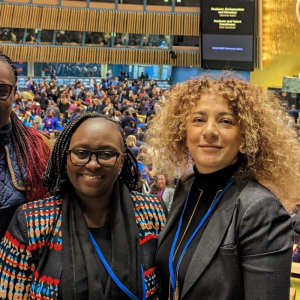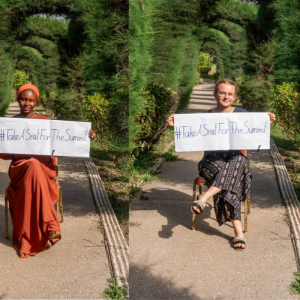Last month I was in Kenya, visiting organisations in southwestern regions to learn more about female genital cutting in Kenya, and the efforts of organisations seeking to end the practice. Here’s what happened…
A surprising Sunday
Sunday morning in Kisii and it’s a bright one – the lush town under a mix of sunshine and fluffy clouds. I’m collected from my hotel by Mary Mogaka, Branch Manager of the YWCA (Young Women’s Christian Association, set up in 1912) Kisii branch, one of the organisations I’ve come here to visit. She’s come straight from church and is in her Sunday best so I’m glad I’m smartly dressed, too! In the YWCA’s car we drive into Kisii town centre and Mary explains we’re going to meet her colleague and then she’s taking me out to the countryside to meet her family, where her auntie has just passed away. This is the kind of thing it’s impossible to plan for, and once again, I’m glad my outfit is respectful and smart.
Mary’s colleague hasn’t arrived yet, but she introduces me to Rebecca, another Auntie, and explains that I’ve come to Kisii to learn about YWCA’s work on FGC. Auntie Rebecca instantly takes a deep intake of breath and whistles back out “FGM… it’s part of the culture! But it is bad. It should stop. Me, I remember it was very very painful”. Mary nods, and chimes in with her experience, “It happened to me, too, and it was so painful. I remember it so vividly, I was 10, and by the time you’re 10, you know what is happening to you.”
They go on to tell me about how girls used to be taken away for a month, to be secluded, during which time they were cut, and the family celebrated, and Rebecca says “and then when you come out, the family celebrates and eats again, because you’re out!” Mary tells me, “We weren’t allowed to wash. Not even our hands. Certainly not in between our legs. We had to wait until the old lady came to take us to the river on the last day – she took us to wash.” This is something I’ve not heard before. Rebecca adds “and you have ash rubbed on your face, and wash it off in the river.” I asked if the lady who takes the girls to the river is the same lady who cut them, but she is not. At the same time as being secluded, girls would learn about being a woman, they sing songs – and they celebrate.
But I soon discover that things have changed a lot in Kisii, and that, while FGC used to be quite a public, ceremonial undertaking, a real rite of passage, it’s now more underground, private, and hidden, with most girls being cut in the family’s rural home in the countryside by a traditional cutter, or by medical personnel, either in health centres, or in the bathroom at home.
After meeting Mary’s colleague and planning my visit, we head, with Mary’s cousins, to her family’s village. There, I eat my first rice and beans of the trip, and have a moving afternoon, speaking with the old man who has just lost his lifelong sweetheart, and hearing from him about his life as an English teacher and then a headmaster. The conversation with him is as affecting as hearing about Mary and Rebecca’s experiences of FGC, and I have to hold back tears as I well up – but no one else is crying, it’s not the done thing when someone dies.
Monday: the YWCA, Kisii Branch
Monday morning is sunny, although I’m assured by the lovely Massi, manager of my hotel that it will definitely rain, at least once, maybe two or three times today, because “this is Kisii!” After a huge breakfast (good breakfasts in Kenya) the YWCA driver collects me and we drive across Kisii to the YWCA branch, which is a lovely office set in a lush green garden on the outskirts of Kisii town. Mary tells me I am dressing like a Kenyan woman, and we drink tea and eat bananas as we talk. Here, I sit with Mary and Paul and hear all about the YWCA’s work on FGC, and how the YWCA is working with communities in the area. YWCA’s activities in Kisii include working with diverse sections of the community, including girls, parents, cutters, opinion leaders, teachers, and health workers, as well as men and boys. YWCA delivers community-based programmes in the area around Kisii town, and has been working on FGC in Kisii since 2006, also incorporating FGC messaging into the community-based programmes.
Just after noon, we head to the outskirts of Kisii to a primary school, where Keziah Bianca is delivering training for about 30 girls. The girls, age between 6 and 12 have enrolled in the programme to learn about the harms of FGC, and will graduate at the end of this week, knowing more about FGC. Keziah is truly inspiring. She was herself cut age 15, she now volunteers for YWCA delivering training to all members of the community, and she tells me “I believe FGC can end in Kisii. It is hard, but it can end because enough people want it to end.” She delivers training which has been planned with the Kenya-wide YWCA, but with her own updates and changes. She says of the girls we meet today, “I am hopeful for them that they will not be cut. They are sweet, but they are made of strong stuff.” Keziah has written a powerful blogpost here about her experiences and what she’s doing now. Happily, I saw Keziah again at YWCA training when I visited the head office in Nairobi at the end of my trip.
Sure enough, it rains in the afternoon. I am hearing from Paul, Programme Co-ordinator, about the different programmes delivered by YWCA Kisii and the monitoring of the programmes, and the heavens open, rain battering the tin roof. Paul, too, is hopeful, and especially inspired by the potential of integrating FGC across all of YWCA’s programmes. He says, “The thing that keeps me doing this job is knowing I am doing something important, and a good job, and when the girls come and tell me that our training has given them the strength to speak out, I love it – we have done a good job.”
Tuesday: RWAYDO, reaching for under-served populations
The next day I head for the offices of RWAYDO (Reach Women and Youth Development Organisation) where I meet Paul, one of the directors, John, Edna and Stella. An intense morning discussion emphasises to me, over and over again, how FGC is held in place in Kisii. People in Kisii believe that FGC is a deeply-rooted, cultural tradition which has been practised for ever, and is held in place because a girl must be cut to be married. In Kisii, there is a lot of stigma for girls who are un-cut, and the name-calling and ostracising is a far greater risk than any perceived health problems. And anyway, in Kisii FGC has become very medicalised, which means people believe it is less dangerous. This conversation really emphasises for me how severe the challenges are facing the organisations working in Kisii, a region where more than 90% of women are cut.
However, my first visit with RWAYDO is to a group of retired school teachers, 25 women who meet once a month and help each other (and others) out with small loans, and discuss the most important issues of the day. Both YWCA and RWAYDO have previously mentioned to me that the older generation is the most resistant to change and the hardest to work with – but the Mywanza women’s group are highly educated and largely quite enlightened. Following some coaxing by facilitators Paul and Stella, the women come out of their shells and start talking openly and honestly about FGC. This includes a lively rendition of the song which used to be sung when girls were cut – many of the women join in, getting up and dancing, and it really shows what a celebration cutting used to be in Kisii. One woman, Nora, the host of the meeting, says, “It’s not needed for a girl to be cut, and only those who don’t understand, continue to cut their daughters. I believe most people are moving away from FGC. Personally I don’t know any family who has done it recently. But there are some doing it secretly.” It’s so interesting to hear the experiences of these women, and they are moving and real, “My friend died. She bled to death, so I hate it. My sister was not cut, but I already had been. My daughters are not cut, nor my granddaughters.” As the discussion moves from what used to be towards how FGC is now, and what needs to happen to end it, the emphasis is on education, education, education, and trying to shift the society’s belief that a girl’s morality and virtue is linked to being cut – “Girls need to learn responsibility! This does not come from being cut!”
Families Matter!
In the afternoon, I’m back with YWCA and head to Nyamondo, a community in Mosocho, not far from Kisii. There are about 40 programme participants gathered in a school room, and it’s the end of the first wave of the Families Matter Programme, a USAID funded programme which YWCA is delivering in the region, and which incorporates discussions about FGC. There are 960 participants in the current wave, and those here today are here for the certificate presentation. Before this happens, participants get up and tell us about what they’ve learnt – the focus of the programme is on enabling parents to speak to their 9-12 year olds about sex and sexuality before they become sexually active, supporting them to make healthy decisions. YWCA has 12 facilitators working in this community, and all of the facilitators began their participation as volunteers, and receive regular training from YWCA.
After 2 days in Kisii, I’m feeling like I have a much better grasp of FGC in the area, but there’s still more to see tomorrow with RWAYDO and YWCA. The organisations working here have a challenging job, and while people are outwardly saying that things are changing, it seems that this could mean cutting is going underground.
More soon…

